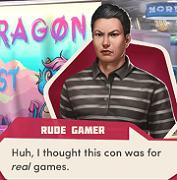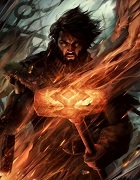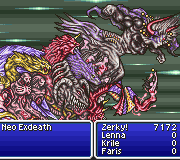|
it's worse when you know they'll be friends ten books down the line once they share the common trait of both being trillionaires
|
|
|
|

|
| # ? Apr 28, 2024 22:10 |
|
WHEN ARE THEY GONNA TO GET TO THE SPACE BATTLE FACTORY
|
|
|
The Chad Jihad posted:WHEN ARE THEY GONNA TO GET TO THE SPACE BATTLE FACTORY Second to last chapter, I think? This book has one of the better battles in the Harrington series, but you have to wade through SO much poo poo to get to it.
|
|
|
|
|
FuturePastNow posted:it's worse when you know they'll be friends ten books down the line once they share the common trait of both being trillionaires Space Trillionaires, thank you! Which makes it worse as this means they're worth like a hundred times as much as they would if they were mere trillionaires. The Chad Jihad posted:WHEN ARE THEY GONNA TO GET TO THE SPACE BATTLE FACTORY It starts mid-way through Chapter 30, and ends at the end of Chapter 31. That's all the action this lengthy book has. As a taste test for that, let me quote the most infamous part of the book. At the very end of the book, right as the action is about to kick off during Chapter 29, David Weber decided to completely stop everything for what everyone loves the most: A poorly-timed infodump! Uneditted so you can soak it in posted:She chopped off that train of thought and made herself lean back. The timing of Sirius's departure could mean only one thing, she told herself, and Brigham's projection of her course confirmed it. Sirius was, indeed, headed for the Tellerman wave, and the Tellerman was one of the "Roaring Deeps," the most powerful grav waves ever charted. More than that, it headed almost directly towards the People's Republic of Haven. If there truly was a Peep battle squadron out here, the Tellerman would take Sirius to meet it at two and a half or three thousand times the speed of light.
|
|
|
|
TheGreatEvilKing and Kchama There is no shame in abandoning your As the thread OP, I will not shame or mock either of you for doing so, the shaming and mocking of PupsOfWar re: failure to deliver their RingoManifesto will continue though. After all I have willingly read Systemic Shock by Dean Ing twice now. Systemic Shock is my forever-baseline for terrible mil-scifi, no ebook versions of it exist for good reasons.
|
|
|
|
I'm gonna see how far I get. I will not promise a consistent schedule, but I can't promise interesting commentary on Safehold either. That said, I am definitely cutting it off after Book 1. There is no reason to read the rest of the series.
|
|
|
|
|
I'm sorry. I tried. I can't read that. My eyes just...stopped working.
|
|
|
|
StrixNebulosa posted:I'm sorry. I tried. I can't read that. My eyes just...stopped working. The long story short of it is: Hyperspace happens to work just like the ocean circa Age Of Sail.
|
|
|
|
About half of that could be omitted and put in a later book, and the rest could very easily be broken up and put literally anywhere else in this one. It would even have made a few scenes flow better, because you'd know what they were going on about. It is even worse in context, because it is dropped in the middle of the book's climax. If you're invested in the plot, then you're going to be extremely annoyed that it suddenly comes to a screeching halt.
|
|
|
|
|
Kchama posted:The long story short of it is: Hyperspace happens to work just like the ocean circa Age Of Sail. But it doesn't... even the blatant stuff like currents only vaguely work like the ocean.
|
|
|
|
Gnoman posted:About half of that could be omitted and put in a later book, and the rest could very easily be broken up and put literally anywhere else in this one. It would even have made a few scenes flow better, because you'd know what they were going on about. This is all 100% true and accurate. It really makes the already incredibly glacial pace of the book even more excruciating. Literally the book gets to the action starting and then just stops for page after page of COMPLETELY irrelevant infodumping. As you said, a lot of it could have been put literally anywhere else, like, you know, that time they actually go into hyperspace near the start of the book, explaining it when it was relevant rather than waiting until the book's climax to remember that he hadn't explained a thing. He seems to be just writing and forgetting that the readers don't know the setting and only remembering suddenly that he forgot to say anything and then just hastily throwing in an infodump that doesn't really help at all. Also, I feel like summarizing a bunch of chapters just because they're so boring. On Basilisk Station Chapter Twenty-One McKeon repents for being a jealous jerk and becomes a worshipper of the One True Goddess, Honor Harrington. quote:"I hated you." His voice was muffled, bouncing back from the bulkhead as he looked away from her. "I told myself I didn't, but I did. And it didn't get better. It got worse every day. It got worse every time I saw you do something right and realized I'd wanted you to do it wrong so I could justify the way I felt. I'm glad they actually showed this on screen and didn't just tell us about it after the fact. Oh, wait. The chapter ends posted:"Stupid, wasn't it? I don't think a kid like Cardones or Tremaine is a worthless gently caress-up just because he makes a mistake, admits a problem. But I couldn't admit that I had one. Not to you." So McKeon is now her loyal toady forever. That's the entire chapter, with not a lot cut out. On Basilisk Station Chapter Twenty-Two This chapter is just Politics Chat mostly. Boring. Does this ever come up again? posted:He turned back to the huge fireplace and added another log. He adjusted it with the poker, settling the native hemlock (which, in fact, bore very little resemblance to the Old Earth tree of the same name) into the bed of coals, then straightened and replaced the poker in its stand as he checked the wall clock again. It was twelve past comp, well into the twenty-seven-minute midnight "hour" officially called Compensate that adjusted Manticore's 22.45-hour day to permit use of Standard Reckoning time units, and his eyebrow rose again. Even allowing for the time zone difference, it was unusual for his brother to screen him this late—and even more unusual for him to specify the exact time at which he would call. As mentioned, I don't remember Compensate ever coming up again. Also glad to know that Native Hemlock is nothing like Actual Hemlock. Also, why do they keep calling it Old Earth? There's no New Earth as far as I can tell. Anyways the chapter is about attempts to repeal Annexation except of course the bad guys are incompetent loser politicians and so this is actually exactly what the Good Guy Politicians want as it gives them power to amend everything to give them full power. They also manage to work out how to keep Pavel Young away for a while and it goes off perfectly. They have no issues and the chapter ends with them winning everything. Boring. Chapter Twenty-Three Honor finds out that every political battle being fought has been won by her side and crushingly so. The other side is discovered to be evil and terrible and did everything wrong. There's a lot of talk about the ground forces that I can't care about in the least, and that's the chapter. It's actually very long, but also basically "the losers lose" as Honor dances happily. have a dumb quote posted:It seemed New Kiev was feeling the heat from the financial community in general and, apparently, from the Hauptman Cartel in particular. From Dame Estelle's remarks, Honor was beginning to suspect that the big Manticoran merchant cartels had contributed rather more heavily to the Liberal Party's political coffers than she'd ever thought. The notion of an alliance between the parliamentary advocates of increased welfare spending and the captains of industry seemed a bit bizarre to Honor, but something was certainly giving them an awful lot of clout with the Opposition, for Countess New Kiev had decided to turn the screws on Dame Estelle to propitiate them. I'll end here. That should help me get back on track. And I still might skip the rest of the chapters so I can get to the actual action of the book. Kchama fucked around with this message at 00:42 on Jan 13, 2020 |
|
|
|
Monocled Falcon posted:But it doesn't... even the blatant stuff like currents only vaguely work like the ocean. I'm not saying the actual in-universe mechanics works like the ocean, but the out-of-universe 'working'. It's blatantly meant to replicate how sailing was in the Age of Sail. EDIT: Like I wasn't speaking literally, but just getting across what Weber is evoking, since the actual technical aspects are dumb. Kchama fucked around with this message at 00:41 on Jan 13, 2020 |
|
|
Kchama posted:
There's a few references to "New <earth place>" scattered about, but that's only a partial explanation - we don't talk about Elizabeth II of the House of Windsor being the Queen of Old England, or of Vicente Fox being the President of Old Mexico. It is a very strange convention. It doesn't really hurt anything since you know what he means (as opposed to, for example, talking about a ship's sails before you tell us what the hell the sails are for), but you're right - it is odd. Compensate is just there to acknowledge that not all planets have the same day - one of the draws of the series (to those with the right frame of mind) is that Weber at least pays lip service to a bunch of things that most works ignore - while the hemlock thing is just another example of the "analogy-the-reader-will-recognize" thing I was talking about before. Also, your quote tag is broken.
|
|
|
|
|
quantumfoam posted:Finally ended up reading a Marko Kloos book (Lines of Departure) via a local library rental. The first book is the usual boot camp sequence, the protag getting sent to a peacekeeping unit on Earth, and then getting transferred to the space branch. Most of it serves to introduce him, set up how lovely life (in North America anyways) is, and set the stage for the rest of the series. (which as has been said earlier is mostly about humanity getting clowned on and the protag and his wife getting PTSD.) I just started the first book in his new series the other night and it feels like it has a stronger opening. So far it's about a intel officer POW/convicted war criminal from the losing side being demobbed and going home, and a power armor NCO and a ship captain with the occupational forces facing a suddenly renewed insurgency. mllaneza posted:The Ivan and Cordelia books were amazing. She seems to be done with the series (we did get an Ekaterin novella recently) , and that's okay since I like the Penric stuff she's into now. The series has reached a decent endpoint yes, Miles is too old and politically/dad important to go off gallivanting around any more. If there are any new stories I suspect they'll either be about other people like the Ekaterin novella, or might skip forwards a decade or two and feature their kids as characters.
|
|
|
|
Gnoman posted:There's a few references to "New <earth place>" scattered about, but that's only a partial explanation - we don't talk about Elizabeth II of the House of Windsor being the Queen of Old England, or of Vicente Fox being the President of Old Mexico. Yeah that's why I was questioning it the Old Earth thing. It's not really a big deal but it just kind of makes you go "But why?" And yeah I recognize that's why it's there, but the whole detail is pretty much meaningless to the scene and never comes up again so it might as well just not exist. I ninja-editted the quote tag right before you mentioned it.. For some reason, when I paste it, it keeps dropping the final quote tag and everything after it. Dunno why.
|
|
|
|
Comedic MilSF story about all the planets that declared themselves to be Third Rome getting in a big fight.
|
|
|
|
we'll always have Nouveau Paris
|
|
|
|
Thinking on it for a minute or so, maybe the use of "Old Earth" is to signify the use of the proper noun referring to humanity's birth world, as opposed to more figurative uses of the generic word "earth". In text capitalization does the job for you, but that's not always clear in speech.
|
|
|
|
C.M. Kruger posted:The series has reached a decent endpoint yes, Miles is too old and politically/dad important to go off gallivanting around any more. If there are any new stories I suspect they'll either be about other people like the Ekaterin novella, or might skip forwards a decade or two and feature their kids as characters. I want a book about Byerly Vorrutyer on Jackson's Hole with the Cordona family.
|
|
|
|
Anshu posted:Thinking on it for a minute or so, maybe the use of "Old Earth" is to signify the use of the proper noun referring to humanity's birth world, as opposed to more figurative uses of the generic word "earth". In text capitalization does the job for you, but that's not always clear in speech. This is actually presolved in the setting, which is why it's baffling. They just call it Terra.
|
|
|
|
Does Earth not exist anymore in that universe, or is it no longer inhabitable or whatever? I can see "Old Earth" being used in that context....it's mankind's original homeworld, now lost, but the idea of it still exists to bind us together. "Oh, wanderer, Do you hear the cry of Old Earth? Land of our birth now lost and forgotten. Still my heart calls out for Terra, home of our fathers. though we are nomads without homes of our own"
|
|
|
|
It was almost destroyed in the backstory, but in the "present" it is the capital system of the largest space country.
|
|
|
|
|
Gnoman posted:It was almost destroyed in the backstory, but in the "present" it is the capital system of the largest space country. Well, 'almost destroyed' is a little strong, if I remember correctly. It had a big war and lots of people died but the planet itself was fine.
|
|
|
Kchama posted:Well, 'almost destroyed' is a little strong, if I remember correctly. It had a big war and lots of people died but the planet itself was fine. Well, as fine as a planet that was ravaged by grey-goo nanotech and genetically-engineered bioweapons (not to mention the supersoldiers) can be. Funnily enough, that's another example of "something becomes a major plot point long before Weber explains it", although that was partly Eric Flint's fault.
|
|
|
|
|
Gnoman posted:Well, as fine as a planet that was ravaged by grey-goo nanotech and genetically-engineered bioweapons (not to mention the supersoldiers) can be. If it manages to become an economic capitol of anything, then it ended up pretty fine! Though I'm 900% certain the grey-goo nanotech and superviruses thing was only mentioned in one of the Eric Flint books I didn't read and the only stuff mentioned before was the super-soldier fights. I've always felt he amplifies a lot of the troubles with the books.
|
|
|
|
Gnoman posted:It was almost destroyed in the backstory, but in the "present" it is the capital system of the largest space country. And the capitol of both Old Earth and the Solarian League is Old Chicago. It's either implied or maybe stated that this is the biggest city that survived the Final War
|
|
|
|
FuturePastNow posted:And the capitol of both Old Earth and the Solarian League is Old Chicago. It's either implied or maybe stated that this is the biggest city that survived the Final War Wait a sec.... Did David Weber "adopt" backstory from the live-action Buck Rogers tv series for his Honorverse setting? Oh this is getting funny. Erin Gray and Honor Harrington look uncannily alike too.
|
|
|
|
Finished Aftershocks by Marko Kloos. More on the space opera side of things, I liked it but it was somewhat short and really just a opening act so wait if you don't like cliffhangers. My speculation is that the insurgents are either Werewolf/Gladio stay behinds, or a operation by the other planets to have an excuse to come down harder on the Gretians.
|
|
|
|
quantumfoam posted:Wait a sec.... He "adopted" everything else in the story, so sure why not.
|
|
|
|
FuturePastNow posted:He "adopted" everything else in the story, so sure why not. Pretty much. Also I'll probably make another post tonight or tomorrow. I've just been enjoying another brief Honorverse vacation.
|
|
|
|
On Basilisk Station Chapter 24 Today's chapter begins with a spot that is more or less "Everyone on the Fearless worships Honor because she is the greatest ever. The only one who doesn't is the Surgeon Commander who is a Bad Person And Lazy And Evil. quote:Lieutenant Samuel Houston Webster hummed to himself as he worked his steady way through the mountain of routine signal traffic. Venerable and sacrosanct tradition required every communications officer to resent the paperwork his position entailed, but Webster was guiltily aware that he failed to measure up in that respect. There were days he resented the time it used up, yet the fact that he, alone of his ship's other officers, knew as much about Fearless's information flow as the Captain tickled his ego. More than that, it was surprisingly difficult to resent anything he "had" to do for Captain Harrington. It's not exactly compelling stuff. The nextp art of the chapter is just... Honor doing boring poo poo for a while, and is more "Honor is actually highly beloved" stuff too. Not a lot of it is especially interesting or all that relevant except for one bit. Pavel sux posted:It was a routine dispatch from the CO of HMSS Hephaestus to Admiral Lady Lucy Danvers, Third Space Lord. Danvers was the head of BuShips, and Vice Admiral Warner's dispatch was a "regret to inform you" response to Captain Lord Young's recent request to BuShips for special refit priority. Admiral Warner's inspection teams had, it seemed, confirmed Captain Lord Young's own initial assessment and determined that heavy wear to the Warshawski sail tuners aboard Her Majesty's heavy cruiser Warlock made their replacement a matter of urgent priority. This necessary overhaul meant, unfortunately, that that vessel's refit must be extended for a minimum of eight more weeks in order to carry out the required installation and tests. Vice Admiral Warner would, of course, expedite the work in every possible way and remained Admiral Danvers's obedient servant and etc. The next bit is more... blah blah blah blah nothing ever loving useful. The next bit is more of the same but there's one bit... quote:The screen was painfully bright in the dark cabin. It was also a split-image conference call, and Dame Estelle looked out of one side of it. Fearless had adjusted her shipboard day to match that of the Government Compound, and like Honor, Matsuko wore a robe over her nightclothes, but Barney Isvarian was in uniform in the other half of the image. Honor saw Surgeon Lieutenant Montoya, her own assistant physician, behind him and recognized the antiseptic cleanliness of one of the NPA's native clinics in the background. Why is she wearing a kimono? It's implied that this is suppose to be the robe worn over the nightclothes, but that still doesn't make much sense. You would not be wearing a kimono in a setting like this. Anyways Matsuko has a message from a nomad Medusan who says they were told not to go to the Delta Cities in the winter. And also a native nomad had shown up with mekoha poisoning and the ammo for a Ferguson rifle, who conveniently ties everything together with his dying babble, and also made it clear they're going to run off the Manticoreans. Which is quite a lot to get out of someone who apparently has no motor control, and is a race whose speech requires fine motor control. Everyone obviously knows its Haven because there's literally no one else it could really be. quote:"That was my first thought, too," Matsuko said quietly. "But because it's the first possibility to occur to all of us, I think we'd better work on keeping an open mind about it. On the other hand, I can't think of anyone else it might be, and Haven has certainly been the most persistent in insisting that we don't have real sovereignty down here." I'm pretty sure this is literally the only book that the Midgard Federation is ever mentioned in. I'm pretty sure Weber forgot it existed after this. Also nobody can figure out how this plot helps Haven, and I'm inclined to agree that it doesn't make much sense. They do guess that the nomad is from 300 klicks away because that's how far he could run before he died from drug overdose (I'm surprised they have such accurate information on that) but his tribe is from 700 miles away. And that's the chapter. Oh boy. Kchama fucked around with this message at 02:02 on Jan 21, 2020 |
|
|
|
I would not be very surprised if the kimono was because Weber read about how noted orientalist Douglas MacArthur would wear one while he was Chief of Staff, and being a example of a ur-boomer author he buys the line that MacArthur was 🙏America's Greatest General.🙏
|
|
|
|
C.M. Kruger posted:I would not be very surprised if the kimono was because Weber read about how noted orientalist Douglas MacArthur would wear one while he was Chief of Staff, and being a example of a ur-boomer author he buys the line that MacArthur was 🙏America's Greatest General.🙏 Probably. It just immediately struck me as very out of place because of the implication that it was bed-clothes or a robe to wear when getting out of bed. It's pretty much akin to wearing a three-piece-suit as pyjamas or a bath-robe.
|
|
|
|
I assume it's setting up her kung-fu prowess
|
|
|
|
FuturePastNow posted:I assume it's setting up her kung-fu prowess I don't think that's even thought of for a few books when it becomes relevant to the book's plot. That's kind of a thing with Honor's skills.
|
|
|
|
Kchama posted:Probably. It just immediately struck me as very out of place because of the implication that it was bed-clothes or a robe to wear when getting out of bed. It's pretty much akin to wearing a three-piece-suit as pyjamas or a bath-robe. There is in fact a women's loungewear concept which is referred to as a kimono despite only superficial resemblances to Japanese kimonos: 
|
|
|
|
Aerdan posted:There is in fact a women's loungewear concept which is referred to as a kimono despite only superficial resemblances to Japanese kimonos: Sure, but that's explicitly not what's being used here. This is a traditional-rear end kimono with an obi (belt) and everything. Also, On Basilisk Station Chapter 25 So this chapter starts with more of our favorite scene: Designated Villian, Once Again, Can Do No Good. It sucks, and is a perfect example of why this book is so loving boring. It only feels like it has any life or care when it's making GBS threads on someone Honor dislikes or worshipping Honor, and pretty much every scene is laser-focused on one of those. Which means that the scenes are dull and repetitive, with little of the supposed action that's suppose to be the draw to these books. Suchong Sux posted:Honor looked around the briefing room table at her officers. Aside from Cardones, who had the watch, every department head and acting department head was present. Ensign Tremaine sat in, as well, for Honor had wanted his input from his own experiences planet-side. Each face was tight and worried as she finished briefing them on Dame Estelle's call. I hate this book. Anyways Manticoreans are still incredibly racist and the books are incredibly cool with this. Actually, this is one of my core complaints with Weber's writing style: He doesn't understand how to have characters sound different. Pretty much everyone talks exactly the same, even down to using the same style of slurs against everyone else. You can easily see it in the chapters of Safehold, too. In fact, I can only think of a couple of characters who legitimately sound different, and it's generally the Evil Religious People, because they actually use different terminology. For the most part, anyways. Oh, and I guess the Evil Communist phase Havenites, who speak like generic Soviets. So they plan on capturing the evil Medusan shaman with generically named battle armor, but they're apparently barred from doing anything major unless the ycan demonstrate direct off-world interference unless the shaman's followers use their weapons. Which doesn't make a lot of sense, as just them HAVING the weapons should demonstrate the direct off-world interference as one can be pretty sure that the Bronze-Age Medusans didn't just design a Ferguson Rifle specifically out of whole-cloth as their first ever gun. This entire subplot is SO loving STUPID posted:"There may be some good news mixed in with the bad, Ma'am," the Marine offered. "Major Isvarian's people should be able to develop at least a little new intelligence on the Stilties' capabilities out of this. At best, they may be able to pinpoint a target outside the Delta for us. If the major can find this shaman, we might be able to stage a quick raid in battle armor and snap up his weapons—maybe even grab him—before he ever gets close enough to the enclaves to be a threat." Also apparently battle armor has trouble with Bronze Age weapons and Civil War-era rifles. Which makes me wonder how it handles the They proceed to have a chat about how it clearly has to be Haven and why aren't they just assuming it's Haven and to be honest they should have just been doing this sooner. quote:"You know, Skipper," Dominica Santos said slowly, "I've been thinking about what you said. About all this being just a part of some overall off-world scheme." Honor cocked her head, and the engineer waved a hand. So Haven are Generic Evil-Doers who plan on killing their own officials just to allay suspicion, and this is naturally obvious since Haven is super evil. Anyways Haven has made it obvious what they plan on doing by having the ship they plan on doing everything with be literally parked in orbit for months with a problem that literally anyone with the slightest bit of expertise could see through. Haven can't do anything right posted:"Wait a second, Skipper. I just thought of something." He tapped on his terminal for a moment, then nodded to himself. "I thought I remembered that." He turned back to his captain. "You remember when we were talking about the decline in Havenite traffic to Medusa?" Honor nodded. "Well, the fact is that their Junction traffic is still running at normal levels, but there are only two Peep ships in Medusa orbit right now. That courier boat of the consulate's and the freighter Sirius." Also as a benefit, it means that they can get Pavel Young in trouble too! Also Everybody Loves Honor. quote:"Very well, ladies and gentlemen. I'll screen Dame Estelle with your comments and suggestions. In the meantime, I want our orbit shifted." She looked at Panowski. "I want us placed within two hundred kilometers of Sirius. Once we get there—" she turned her eyes to Tremaine "—I want you to take a cutter to the closest Manticoran ship. I'll give you a hardcopy dispatch for her master." So beyond the whole "Everyone loves Honor" aspect there's also the whole "you can turn passive sensors up more" which sounds like they're active sensors, not passive sensors. Also as far as I know they only have gravitic sensors, which detects impellar wedges, and then radar and lidar which I suspect aren't going to be the best for this sort of thing.
|
|
|
Kchama posted:
I still have no idea whatsoever what you're basing this on. Suchon's showing a racist attitude here, but gets slapped down. quote:Actually, this is one of my core complaints with Weber's writing style: He doesn't understand how to have characters sound different. Pretty much everyone talks exactly the same, even down to using the same style of slurs against everyone else. You can easily see it in the chapters of Safehold, too. In fact, I can only think of a couple of characters who legitimately sound different, and it's generally the Evil Religious People, because they actually use different terminology. For the most part, anyways. You couldn't be more correct here. Almost everyone uses the exact same slang and has the exact same verbal habits (for an extremely obvious example, everyone except the Graysons and Masadans use their own pronouns when referring to an unknown officer). They even use the same military ranks terminology, which doesn't make sense even within the groups that come from English-speaking cultures, which at least two of the major powers don't. quote:So they plan on capturing the evil Medusan shaman with generically named battle armor, but they're apparently barred from doing anything major unless the ycan demonstrate direct off-world interference unless the shaman's followers use their weapons. Which doesn't make a lot of sense, as just them HAVING the weapons should demonstrate the direct off-world interference as one can be pretty sure that the Bronze-Age Medusans didn't just design a Ferguson Rifle specifically out of whole-cloth as their first ever gun. The stated justification for seeking proof before doing anything is that they have to justify their actions on the international stage as well as obeying their own "do not interfere with the natives" laws. Nothing here suggests that battle armor is vulnerable to the "native" rifles, unless you're seeing something I'm not. They concern they voice here seems to be that of collateral damage and the threat to people that aren't in battle armor. So they want to hit the shaman where there's no non-combatants or unarmored friendlies. As for Haven sacrificing their own people, that's far from unheard of for covert operations. For a notable example, the Soviet Union shelled one of their own villages along the Finnish border to provide justification for the Winter War in 1939. quote:So beyond the whole "Everyone loves Honor" aspect there's also the whole "you can turn passive sensors up more" which sounds like they're active sensors, not passive sensors. Also as far as I know they only have gravitic sensors, which detects impellar wedges, and then radar and lidar which I suspect aren't going to be the best for this sort of thing. You're fundamentally correct here. Passive sensors involve using the radars to "listen" for emissions, and using infrared and visual cameras to look directly at the ship. To this, we can add the fictitious gravitic sensors that are so important in this setting. As you say, this isn't something that you can "turn up" very easily except by providing larger (or better designed) antennas and lenses. You can, however, focus them on a specific target, and analyse the data you receive. This is probably what the "most intensive possible scan" is meant to be.
|
|
|
|
|
Gnoman posted:I still have no idea whatsoever what you're basing this on. Suchon's showing a racist attitude here, but gets slapped down. It was part of my talk about how everyone speaks fundamentally the same, including using slurs to talk about pretty much any other group of people. See: 'Stilties', which is super a slur. Also the book's problem with Suchon's attitude isn't that it is racist, but that she's being lazy because it makes her look bad when Honor asks her about what they're like. quote:The stated justification for seeking proof before doing anything is that they have to justify their actions on the international stage as well as obeying their own "do not interfere with the natives" laws. Yes, but the justification is going to literally be the same whether the natives actually pull the triggers on the rifles or not, because the natives have the rifles and they have proof that they have rifles that they couldn't feasibly make themselves. It doesn't make sense as they already HAVE the proof needed to justify what they are doing. quote:Nothing here suggests that battle armor is vulnerable to the "native" rifles, unless you're seeing something I'm not. They concern they voice here seems to be that of collateral damage and the threat to people that aren't in battle armor. So they want to hit the shaman where there's no non-combatants or unarmored friendlies. They specify that they don't want to 'tangle' with them in close quarters in their enclaves but instead want to be able to use air support and longer weapon ranges, as opposed to being worried about any sort of collateral damage. They never even say a word about collateral damage or non-combatants or unarmored friendlies, because the point of the scene is that they're gonna go in guns-blazing and there isn't going to be unarmored friendlies to care about, and they don't profess any worry about non-combatants. Not a word about non-combatants or collateral damage posted:"Understood, Captain. But just knowing where to look and what to look for makes me feel a lot better. I'd much rather catch them in open terrain that lets us use our air support, mobility, and greater weapons ranges than tangle with them inside the enclaves at pointblank." quote:As for Haven sacrificing their own people, that's far from unheard of for covert operations. For a notable example, the Soviet Union shelled one of their own villages along the Finnish border to provide justification for the Winter War in 1939. The Soviet Union's ploy was super flimsy and wasn't really meant to actually ever hold up, and to the point that the place shelled was an isolated guard post and none of the casualties were ever confirmed, just claimed. That's afar cry from what Haven did. There's basically no reason for Haven to have established bases in places that they intended to be attacked by natives, and Honor and co even talk about how the bases are small and seem intended to be used as sacrifices from the start. quote:You're fundamentally correct here. Passive sensors involve using the radars to "listen" for emissions, and using infrared and visual cameras to look directly at the ship. To this, we can add the fictitious gravitic sensors that are so important in this setting. As you say, this isn't something that you can "turn up" very easily except by providing larger (or better designed) antennas and lenses. Yeah I didn't want to explain that I was pretty sure passive sensors are just 'listening' but didn't want to out myself as a complete idiot if I was wrong. As it is, I'm pretty sure that's not what Weber meant at all, and also I'm not inclined to try and explain away his errors as a benefit of the doubt. Kchama fucked around with this message at 06:03 on Jan 19, 2020 |
|
|
|

|
| # ? Apr 28, 2024 22:10 |
|
Weber seems to have his bad-guy characters do a lot of stuff that falls apart the second the good guys spend any time at all thinking about it. It reminds me a little bit of Elizabeth Moon, who while a better writer also has all her villains turn into spluttering morons whenever they appear "on camera"
|
|
|

























